Vocations are not occupations, though they are integrally woven together. To know the difference and the difference it makes is critical, and much of the grief we experience is borne of missing one for the other. Vocation is always the longer, deeper story of someone’s life; for Joy, she was always the creative creator of things she would make that the whole world would someday enjoy. Occupation is not that, but is more the way we describe the things we do along the way of life, entering into particular responsibilities and relationships that are ours, and while shaping and forming us, are more often than not signposts of the deeper vocation. They are not the point; they point to the point.
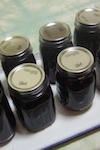 I’m told I’m a good hostess. Plenty of interesting food—down-home victuals perked up by saucy suggestions found in vintage recipe books. I get people talking. I listen for laughter and bring out more food, and by the time the last mug is laid to rest on the coffee table, I’m exhausted. I go to bed saying it was so much work I’m never going to host another dinner. But in the morning I awake smiling, knowing a good time was had by all who came expecting one. Like my mother, I enjoy having entertained, enjoy having offered my home-cooked sustenance.
I’m told I’m a good hostess. Plenty of interesting food—down-home victuals perked up by saucy suggestions found in vintage recipe books. I get people talking. I listen for laughter and bring out more food, and by the time the last mug is laid to rest on the coffee table, I’m exhausted. I go to bed saying it was so much work I’m never going to host another dinner. But in the morning I awake smiling, knowing a good time was had by all who came expecting one. Like my mother, I enjoy having entertained, enjoy having offered my home-cooked sustenance.
Maybe I’m like my mom in yet another way. Mom’s mind-set in me may explain why I continue to pursue creative writing when it’s one of the most strenuous mental workouts I can imagine.
 It isn’t normal for a drummer to call an artist and say, “I’m going to play on your next album, and we are going to do it like this.” He and Matt Pierson (the gift of studio time was for the two of them) were very gentle and careful the way they went about it, and so I was able to get into a different place. What would I write if I wasn’t thinking about audience and due dates? I really wanted to lean into being a songwriter, taking the craft seriously. I wanted to write from a more intuitive place. Writing is never easy for me, but it did help to have this wide-open invitation to write whatever I wanted.
It isn’t normal for a drummer to call an artist and say, “I’m going to play on your next album, and we are going to do it like this.” He and Matt Pierson (the gift of studio time was for the two of them) were very gentle and careful the way they went about it, and so I was able to get into a different place. What would I write if I wasn’t thinking about audience and due dates? I really wanted to lean into being a songwriter, taking the craft seriously. I wanted to write from a more intuitive place. Writing is never easy for me, but it did help to have this wide-open invitation to write whatever I wanted.
 My first baby was an Advent baby. Born just a few days after the Church calendar turned over in late November, she arrived in the thick of Christ’s own birth season. As such, her birthday (and mine too, in a sense) now serves as a preface to all of my Advent meditations, forever changing the way I come into Christmas each year. It invites me to remember the vivid physicality of her birth — its pure wonder and raw intensity — and to ponder the Christmas story in light of it. Particularly the role of Mary, who was singly invited and appointed to aid in bringing deliverance to mankind through her own very natural delivery.
My first baby was an Advent baby. Born just a few days after the Church calendar turned over in late November, she arrived in the thick of Christ’s own birth season. As such, her birthday (and mine too, in a sense) now serves as a preface to all of my Advent meditations, forever changing the way I come into Christmas each year. It invites me to remember the vivid physicality of her birth — its pure wonder and raw intensity — and to ponder the Christmas story in light of it. Particularly the role of Mary, who was singly invited and appointed to aid in bringing deliverance to mankind through her own very natural delivery.
Advent: Calling the Dreamers and Realists, Prophets and Pragmatists
Advent is the time when longing and unmet desires meet celebration and fulfillment, holding the two ends of the spectrum of our human experience in tension without denying either of them. Grief and hope, pain and joy together. Because honestly, how often are we not feeling both simultaneously in some way?
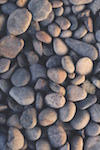 Where was the mystery I’d felt as a child, the anticipation and excitement? The flicker of hope in the candlelight of our Christmas Eve vigil? In the midst of stockpiling my childhood traditions of Christmas joy and imposing them on the life of my new immediate family, I seemed to have signed up for more than my spirit could handle.
Where was the mystery I’d felt as a child, the anticipation and excitement? The flicker of hope in the candlelight of our Christmas Eve vigil? In the midst of stockpiling my childhood traditions of Christmas joy and imposing them on the life of my new immediate family, I seemed to have signed up for more than my spirit could handle.
And then Peter began collecting little things.
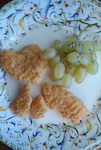 It’s not only that God shines out from orange slices and bookshelves. It’s that with grace, these things make love and goodness. These things—caring for these things, building and cleaning and keeping these things—make a place for the heart to rest and be cared for.
It’s not only that God shines out from orange slices and bookshelves. It’s that with grace, these things make love and goodness. These things—caring for these things, building and cleaning and keeping these things—make a place for the heart to rest and be cared for.
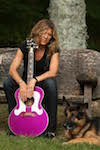 I am contemplative and introverted. I am tactile and love to make things. These are all catalysts for articulating my individuality. I am also an alcoholic, a drug addict, an egomaniac with an inferiority complex and an emotional lightning rod. These things do not supply my identity either, though they are as much a part of me as the traits I cherish. And I am equally grateful for them because the helplessness they triggered ushered me further into dependence on God and finding my place on the path, one step at a time.
I am contemplative and introverted. I am tactile and love to make things. These are all catalysts for articulating my individuality. I am also an alcoholic, a drug addict, an egomaniac with an inferiority complex and an emotional lightning rod. These things do not supply my identity either, though they are as much a part of me as the traits I cherish. And I am equally grateful for them because the helplessness they triggered ushered me further into dependence on God and finding my place on the path, one step at a time.
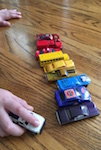 Young children naturally explore who they are and what their world is by spending their time wondering and discovering the world through the joy of play. I learned about friendship, nature, and my small town Ohio world in my hours of play with my friend Kim, and those memories have inspired me to give my own children time and opportunity to imagine and wonder without my interference. The mystery and magic of the benefits of play must be experienced as a child, and if a little water and mud are mixed into the process, then it’s even better.
Young children naturally explore who they are and what their world is by spending their time wondering and discovering the world through the joy of play. I learned about friendship, nature, and my small town Ohio world in my hours of play with my friend Kim, and those memories have inspired me to give my own children time and opportunity to imagine and wonder without my interference. The mystery and magic of the benefits of play must be experienced as a child, and if a little water and mud are mixed into the process, then it’s even better.
 Language distinguishes us, but it’s still just empty space. Space I can see but not touch, and that’s not enough. I need to hold onto a meaning with texture, with a sharpness that cuts into my hands, gets in my blood.
Language distinguishes us, but it’s still just empty space. Space I can see but not touch, and that’s not enough. I need to hold onto a meaning with texture, with a sharpness that cuts into my hands, gets in my blood.
If this is so important, why don’t I understand it, why isn’t it obvious?
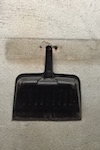 Like committing crummy jokes to memory, remembering is intentional, the discovery of great gain in contentment. Where the debris of spilled baggage reaches its angle of repose, the place where physical objects come to rest along an incline (to borrow from Wallace Stegner), there is rest from the near-constant onslaught of shame, of striving to be enough, to make ourselves worthy, to, in effect, make gods of ourselves. And maybe not being enough is a healthy place to be, a place where God is good and is enough, all the time.
Like committing crummy jokes to memory, remembering is intentional, the discovery of great gain in contentment. Where the debris of spilled baggage reaches its angle of repose, the place where physical objects come to rest along an incline (to borrow from Wallace Stegner), there is rest from the near-constant onslaught of shame, of striving to be enough, to make ourselves worthy, to, in effect, make gods of ourselves. And maybe not being enough is a healthy place to be, a place where God is good and is enough, all the time.
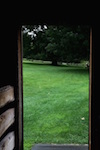 I think fiction writers do have something I lack. They must have the capacity to close their eyes, at least a little bit, to the world outside their window. With eyes half open they are free to imagine. Free to conjure whole worlds and lives. They are magicians as much as artists, and I am the grateful recipient of their magic.
I think fiction writers do have something I lack. They must have the capacity to close their eyes, at least a little bit, to the world outside their window. With eyes half open they are free to imagine. Free to conjure whole worlds and lives. They are magicians as much as artists, and I am the grateful recipient of their magic.
But I cannot close my eyes. Not even a little bit. I write nonfiction because so many memories are tapping at my window, there is no room left in my mind for any invention. I am wholly preoccupied observing and studying that which is already there.
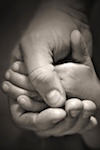 Fidelity is not a cheap word, and it is not an easy word. Its hunger to consume every morsel of life grudgingly offered it — to yield abundance in return — is insatiable. There is no doubt that fidelity includes our sexual habits and behavior, but at the same time it becomes lost if we confine it only to sexual behavior. Fidelity invites us to better understand our relationship to everyone and everything, to enjoy the blessings of rootedness instead of enduring disorientation, and ultimately allows us a better perch for seeing and engaging reality.
Fidelity is not a cheap word, and it is not an easy word. Its hunger to consume every morsel of life grudgingly offered it — to yield abundance in return — is insatiable. There is no doubt that fidelity includes our sexual habits and behavior, but at the same time it becomes lost if we confine it only to sexual behavior. Fidelity invites us to better understand our relationship to everyone and everything, to enjoy the blessings of rootedness instead of enduring disorientation, and ultimately allows us a better perch for seeing and engaging reality.
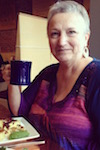 One cold and sleepless night I was suddenly overtaken by a thought that gave me such a panic that I immediately got up, wrapped myself in a quilt, and went to the kitchen to make myself a cup of tea. What if this was it? What if my mother never came back to us? What if all the stories I had heard my entire life went with her?
One cold and sleepless night I was suddenly overtaken by a thought that gave me such a panic that I immediately got up, wrapped myself in a quilt, and went to the kitchen to make myself a cup of tea. What if this was it? What if my mother never came back to us? What if all the stories I had heard my entire life went with her?
 I know that I can never conquer the yoga mountain. I can never do enough to have ever arrived. I can’t fix all the problems and have an incredible, pain-free life. And at the end of my days, no one will tally all the items I crossed off of my to-do list and say, Look at all she accomplished. Because none of that is truly important.
I know that I can never conquer the yoga mountain. I can never do enough to have ever arrived. I can’t fix all the problems and have an incredible, pain-free life. And at the end of my days, no one will tally all the items I crossed off of my to-do list and say, Look at all she accomplished. Because none of that is truly important.
 For two women who had plenty to be angry about, nothing was more cathartic than jumping up and down over a ninety-yard punt return. For a woman filled with rage over the slow disintegration of her husband, screaming at the ref for missing another obvious face mask was therapeutic. There had to be justice and fair play somewhere. Couldn’t it at least be found on the gridiron if nowhere else in our lives?
For two women who had plenty to be angry about, nothing was more cathartic than jumping up and down over a ninety-yard punt return. For a woman filled with rage over the slow disintegration of her husband, screaming at the ref for missing another obvious face mask was therapeutic. There had to be justice and fair play somewhere. Couldn’t it at least be found on the gridiron if nowhere else in our lives?
 Sometimes it seems that I woke up and found myself here all of a sudden, living this middle-aged version of myself. I catch sight of this body, this secret garden, in the mirror, and I am surprised. It is wild and untended but alive, so very alive. This is the key, unearthed. The decision to love this one body I’ve been given, the decision to care for it well.
Sometimes it seems that I woke up and found myself here all of a sudden, living this middle-aged version of myself. I catch sight of this body, this secret garden, in the mirror, and I am surprised. It is wild and untended but alive, so very alive. This is the key, unearthed. The decision to love this one body I’ve been given, the decision to care for it well.
 My mother was doubtful, my sister surprised, my friend Abigail wistful. “You’re so brave,” she said. I’m fairly certain they all expected me to be nervous about spending three days in the city alone. But I could hardly keep the glee out of my voice.
My mother was doubtful, my sister surprised, my friend Abigail wistful. “You’re so brave,” she said. I’m fairly certain they all expected me to be nervous about spending three days in the city alone. But I could hardly keep the glee out of my voice.
 Where do we carve out the mystery of not knowing but believing? We forget that our spiritual journey depends upon truths we don’t fully understand, places we have not yet traveled.
Where do we carve out the mystery of not knowing but believing? We forget that our spiritual journey depends upon truths we don’t fully understand, places we have not yet traveled.
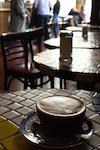 As I settled in across from the stranger who’d welcomed me, we started exchanging pleasantries and cursory details about our lives. I was an editor for a non-profit, he a jazz pianist whose influence I only learned of recently. And then he asked how my day was.
As I settled in across from the stranger who’d welcomed me, we started exchanging pleasantries and cursory details about our lives. I was an editor for a non-profit, he a jazz pianist whose influence I only learned of recently. And then he asked how my day was.
















